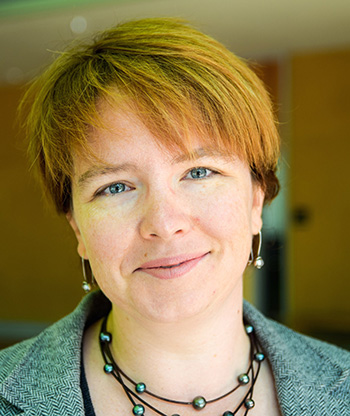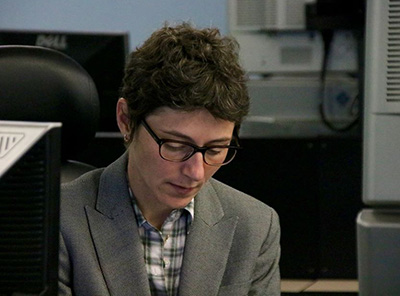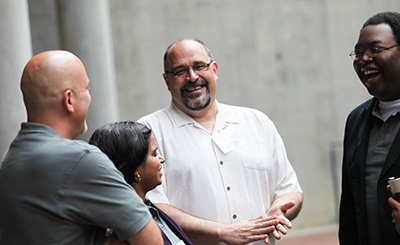As an undergraduate in computer engineering at UC Santa Cruz, Alexandra Holloway dismantled an old hard drive and reassembled it without a cover, exposing the spinning internal components so other students could see how it worked. Her professor, Darrell Long, was impressed, and he used her reconfigured device for a classroom demonstration.
"That really helped me show the other students where the action was," said Long, the Malavalli Professor of Storage Systems Research and director of the Storage Systems Research Center (SSRC) at UC Santa Cruz. Years later, he would become Holloway's Ph.D. adviser.
When she finished her Ph.D. in 2015, Holloway joined a growing number of women earning graduate degrees in computer science from UCSC's Baskin School of Engineering. She was one of three women earning computer science Ph.D.s in 2015 who were advised by Long and another UCSC data storage expert, Ethan Miller, the Veritas Professor of Storage. Seven women advised by Long or Miller have earned their Ph.D.s over the past five years.
According to the American Association of University Women, just 12 percent of engineers are women, and the number of women in computing fell from 35 percent in 1990 to 26 percent in 2013. At UC Santa Cruz, a number of programs in the Baskin School of Engineering are working to recruit and retain more women students in computer science and computer engineering, including Project Awesome, Girls in Engineering, and ongoing collaborations with the National Center for Women and Information Technology.
In graduate school, however, individual faculty advisers have an enormous influence on their students' experiences, and Long's students say his lab is unusually diverse and supportive. In 2011, Long received a Chancellor's Achievement Award for Diversity after one of his students nominated him for the award.
Positive experience
Aleatha Parker-Wood, who completed her Ph.D. in Long's lab in 2013, credits much of her positive graduate school experience to Long's support as an adviser and the lab environment he fostered.
"Darrell has done more for women, minorities, and people of all stripes than anyone I know," said Parker-Wood. "The lab has more diversity in terms of race, gender, and sexual orientation than any other lab I can think of, and that's mostly because of Darrell."
Long said that he strives to facilitate camaraderie among his students, and that his only requirement of them is that they work diligently. "I just try to be supportive and understanding," he said. "My students are like my kids.”
Like Holloway, Parker-Wood first came to Long's attention as an undergraduate in his introductory computer science class. He encouraged both of them to pursue graduate degrees at UC Santa Cruz.
Holloway comes from a line of female engineers, beginning with her grandmother; she and her family immigrated to the United States as political refugees from the Soviet Union. Holloway showed an early interest in technology--as a young girl, she once disassembled all the doorknobs in her mother's home after discovering how screwdrivers work. "My mother was not pleased," she said.
In high school, Holloway took auto shop and bought and restored a 1972 Chevy Nova. Around the same time, she started building her own computers, a hobby that made dissecting hard drives a natural skill. "I still remember Darrell being appalled that some of the other students had never taken their own computers apart," she said.
Gender imbalance
Holloway earned her bachelor's degrees in 2003 and worked as a software engineer in San Diego for three years before returning to UCSC for graduate school. Only then did she begin noticing that she had long been one of the few women in her classes. "It took me so long to notice the gender imbalance," she said. "I thought I was just good at making friends with boys."
At first, she regarded the disparity as a non-issue. But after she became pregnant, she realized that women experience a whole suite of challenges that men never face. Undeterred, Holloway made pregnancy and childbirth the focus of a research project. Working with Sri Kurniawan, associate professor of computer engineering and computational media, she developed a video game called Prepared Partner as a training tool for childbirth support, intended for couples who couldn't afford or weren't interested in traditional birthing classes.
After earning her M.S. with Kurniawan, Holloway transitioned to Long's lab to complete her Ph.D. There, she began focusing on file systems and human-computer interaction. Today, she works for NASA's Jet Propulsion Laboratory, where she studies how pilots interact with tools like the Mars rovers and the Deep Space Network, NASA's international array of giant radio antennas that supports spacecraft missions. Holloway works to make these tools easier to use.
"This is totally my dream job," she said. "I'll never leave."
Unlike Holloway, Parker-Wood immediately noticed the lack of women in the first computer science courses she took in Idaho during the 1990s. "I would walk into my classes and be the only woman in a room of 40 men. Everyone would stare at me, including the professor," she recalled.
Now a principal research engineer at Symantec in Mountain View, Parker-Wood came to UCSC after working in Silicon Valley as a software engineer without a bachelor's degree. "This was in 2000 during the dotcom boom, and they were hiring anyone with a pulse, so I thought, 'Let's give it a shot!'"
Refreshing atmosphere
Transferring to UCSC after her stint in the Valley, Parker-Wood said the difference in atmosphere from her early experiences was refreshing. "The entire computer science department is full of good people who are warm and supportive," she said. "I felt welcome."
When Long first encouraged Parker-Wood to pursue graduate school, she balked at the prospect of more coursework. "I thought he was crazy," she said. "I just wanted to finish my degree and get back to work!"
She eventually reconsidered, however, and decided she wanted to study natural language processing before returning to industry. She asked Long to write letters of recommendation for the many applications she was putting together. He agreed, but on one condition: she also had to apply to UC Santa Cruz to work in his lab.
Though Parker-Wood received acceptance letters from many other graduate schools, she chose to stay in Santa Cruz. Under Long, she worked with scientists from many different fields, from geophysics to bioinformatics, helping them to better navigate and assess huge datasets.
Just as she began interning at IBM in 2010, where she researched and streamlined their file systems, Parker-Wood became pregnant. She announced her Ph.D. candidacy just ten months after her daughter was born. "That was probably the most complicated 18 months of my life, both being pregnant and the first year after my daughter was born," she said. "I spent a lot of my time balancing a baby in one arm and a laptop in the other."
No regrets
At Symantec, she now applies her expertise in machine learning and file systems to help companies enhance their digital security. Though her winding career path did not go as she first expected, she's glad for the outcome. "Instead of earning a Ph.D. in language processing, I went to a file systems lab. It totally altered the arc of my graduate career, but it was fantastic. I have absolutely no regrets," she said.
Graduate students working with Long and Miller benefit from their longstanding relationships with leading companies in the computer and data storage industries, maintained through the SSRC, which Long directs, and the Center for Research in Storage Systems (CRSS), which Miller directs. Their students have opportunities to work on problems important to industry, and many of them receive job offers before they've earned their degrees. Miller's student Rekha Pitchumani, for example, had offers from Seagate, where she did an internship, and after earning her Ph.D. in 2015, she took a senior engineer position at Samsung Semiconductor.
In 2016, several more women are expected to earn Ph.D. degrees in computer science at UC Santa Cruz, including Stephanie Jones, who has been working with Long on advanced storage systems. Jones, who recently accepted a job offer from Intel, said graduate school felt like a long and arduous journey, but she's grateful for where it has led her.
"Looking back, it's easy to say that I worked more nights, weekends, and 14-hour workdays than I'd like to count," she said. "But looking at the grander scheme of things, I met a lot of good people, I made good contacts, and I'm working a job that I love."





